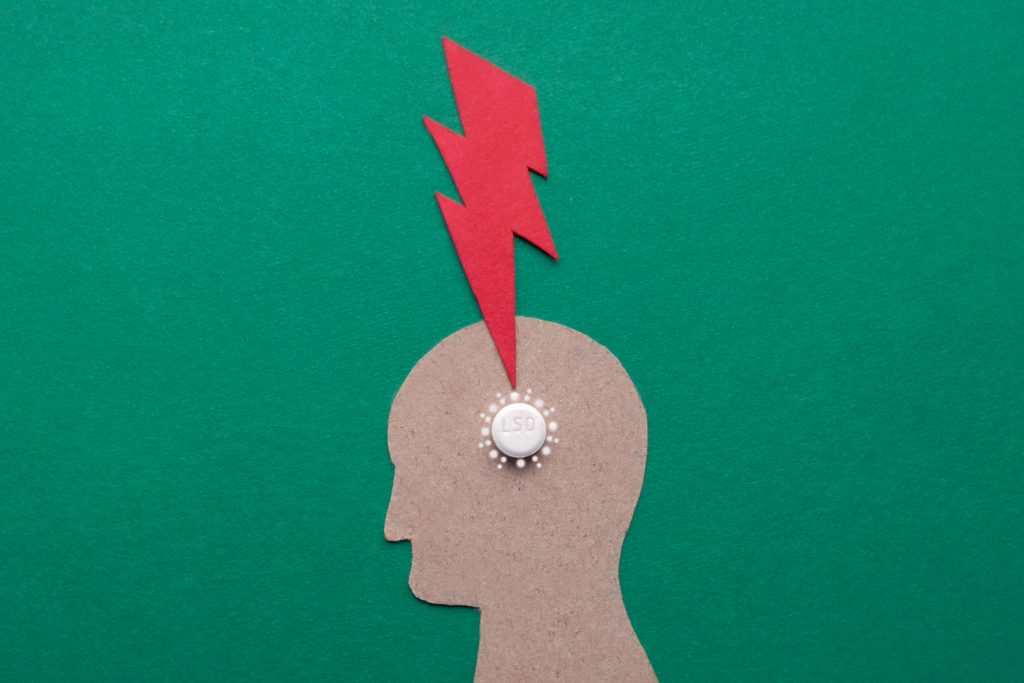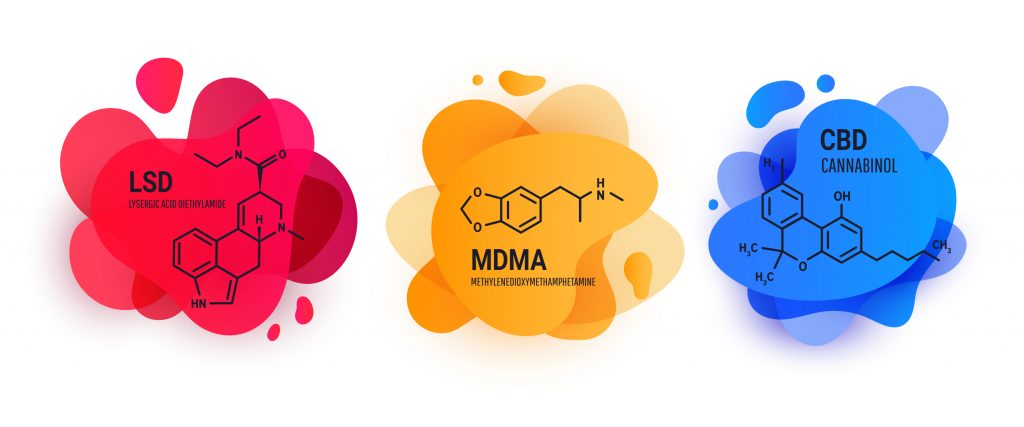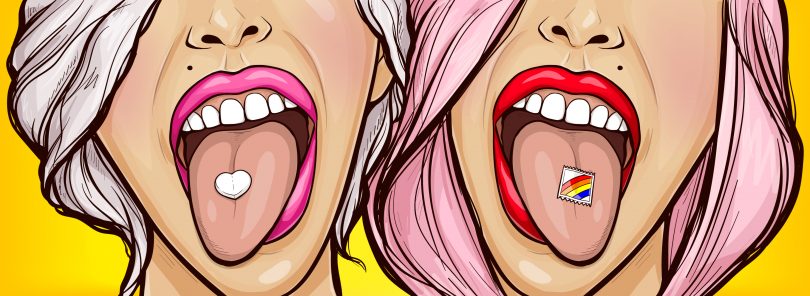For several decades, psychedelics have been uniformly outlawed, with massive campaigns from the late 1900’s used to raise fear and controversy over their effects. Now, as the world acclimates to the medical and recreational use of cannabis, psychedelics are being looked at once again for their medical benefits. In fact, one of the leading points of research is the use of LSD to treat mental illness.
When it comes to psychedelics, cannabis is one of the most popular, and its not hard to see why. THC has medical benefits and makes people feel good. However, for some people, regular THC is just too much. If you’re one of those people, check out our Delta-8 THC deals, and experience THC with slightly less psychoactive effect, and less anxiety.
What is LSD?
LSD, known more scientifically as Lysergic acid diethylamide, is a hallucinogenic psychedelic drug, which was first synthesized in 1938 by Swiss chemist Albert Hoffman. He was also the first person to experience its effects when he accidentally ingested a small amount in 1943. As a psychedelic, it is known for altering perception, feelings, and thoughts, as well as causing visions and sensations that are not actually there (hallucinations). LSD is in a class of drugs called ergolines which are often used to treat disorders like Parkinson’s. Unlike some compounds like DMT, LSD is manmade, though derived from the ergot fungus.
How exactly LSD works to cause the effects its associated with, is still not completely defined. However, certain aspects have been found in research. In one study put out in 2017 from the University of North Carolina, it was found that LSD interacts with serotonin receptors. Serotonin is a neurotransmitter that plays a big role in mood and brain communication. The particular receptor it effects is called 5-HT2AR. One of the interesting things that happens when LSD attaches to this receptor, is that the receptor closes over the molecule, preventing it from leaving quickly. This could very well explain why the drug can last for many hours, even after it has left the bloodstream.
The serotonin receptor it attaches to can activate two signaling pathways through G-proteins and β-arrestins within cells. With LSD, it primarily works through the β-arrestins. The researchers on this study found that different drugs in the ergoline group effect serotonin receptors differently, and found evidence that the compounds themselves can modify the structure of the receptor in order to activate different effects.
Research
There has actually been plenty of research into how LSD can aide in the treatment of mental illness. Back in 2014, a randomized, double-blind, placebo-controlled study was done to investigate how safe and effective LSD is in treating the anxiety experienced by patients with life-threatening illnesses.
12 patients were used in the study, and they were given drug-free psychotherapy sessions, along with two psychotherapy sessions with LSD. A two-month follow-up showed a positive trend according to the (STAI) State-Trait Anxiety Inventory in terms of reductions in trait and state anxiety. The reductions in anxiety related to the LSD were sustained for 12 months. No serious adverse effects were noticed, and minimal adverse effects subsided within one day. The overall outcome of the study was LSD safely decreased anxiety.
In a systematic review of LSD in psychiatry, 11 studies were identified concerning LSD and mental health that consisted of randomized and controlled clinical trials. These were done between the years of 1950-1970 when it was not illegal to use LSD in medical testing, and when LSD was regularly studied for use with addiction, anxiety, depression, and psychosomatic diseases. As part of the 11 studies that made the cut, 567 subjects were administered LSD in doses of 20 to 800 micrograms. The overall finding was that LSD has positive results in psychiatric symptoms, particularly for alcoholism. A grand majority of the study authors from the review cited positive, if short-term, improvements. This was not always seen in long-term follow-ups.
LSD in the treatment of mental illness today
Yet another systematic review was done on studies into LSD from after 1970. This review, called the Modern Clinical Research on LSD was published in 2017. The review looked at five recent studies in London, Zurich and Basel. All studies were placebo controlled. The London studies were single-blind, non-randomized, the Switzerland studies were randomized, double-blind. In all studies, low-moderate doses of LSD were used between 40-80 micrograms. (It takes about 100-200 micrograms for a full LSD effect).
In terms of subjective effects according to validated psychometric scales, the response in controlled settings was mainly positive. Average group ratings for liking the drug and having positive effects reached 90% of the maximum possible on the VAS scale after 200 micrograms had been administered. At 200 micrograms, only a small percentage increase was made for the average of those who had a negative drug effect (<25%), however negative ratings did go up with the increase.
No high levels of anxiety or panic occurred, necessitating no sedation of patients to stave off negative effects. The main feelings experienced during testing were: bliss, altered perceptions, audiovisual synesthesia (think crossed wires and mixed-up responses), and derealization and depersonalization in positive ways. Higher doses included more insightfulness.

In terms of the synesthesia, LSD produced spontaneous experiences, indicating it alters spontaneous processes, rather than creating an induced response. At under 100 micrograms, LSD promoted suggestibility, and at 200 micrograms it inspired mystical experiences during psychotherapy combined with LSD. Similar studies that have been done on psilocybin have shown that more intense mystical experiences are tied to long-term positive benefits.
However, these mystical effects were correlated at a high level with blissful states as well, meaning the long-term response could be more related to blissful experiences than mystical ones. In these studies, LSD promoted feelings of happiness, well-being, openness, closeness to other people, and trust.
In terms of negative effects, they generally didn’t last more than 10-24 hours, and included headache, difficulty with concentration, decrease in appetite, dizziness, dry mouth, nausea, exhaustion and feeling unbalanced. No severe adverse responses were noticed in any of the modern testing. LSD, in general, is considered non-toxic physically.
Why is it illegal?
When looking at all the positive scientific research, and the lack of detrimental side effects, it starts to look very strange that LSD has been illegalized, while pharmaceutical medications to treat the same things often have lower success rates and harsher side effects. While the US government might stick with a tagline of psychedelics being dangerous and having no medical value, there is another underlying story which makes a bit more sense.
LSD and psilocybin were first illegalized in the late 60’s after a years long smear campaign which coincided with the Vietnam war. America was off fighting a battle that didn’t technically involve it, and causing a massive death toll, and unspeakable and unnecessary violence and destruction to residents of Vietnam.
There was already a pretty heavy anti-war movement during that time. Want to speculate on how much bigger and harder to control that would’ve been if the country was focusing on the war as it should have been? The question of why America wanted to be in that war so badly is a whole debate in and of itself, but regardless of the ‘why’s, there are still some heavy truths. In 1994, a guy named John Ehrlichman, who had been the Assistant to the President for Domestic Affairs in Nixon’s administration, made this statement:

“The Nixon campaign in 1968, and the Nixon White House after that, had two enemies: the antiwar left and black people. You understand what I’m saying? We knew we couldn’t make it illegal to be either against the war or black, but by getting the public to associate the hippies with marijuana and blacks with heroin, and then criminalizing both heavily, we could disrupt those communities. We could arrest their leaders, raid their homes, break up their meetings, and vilify them night after night on the evening news. Did we know we were lying about the drugs? Of course we did.”
Is it really any wonder that in 1968 the US passed the Staggers-Dodd bill illegalizing both LSD and psilocybin? Or that in 1971 the Convention on Psychotropic Substances treaty gave it a Schedule I ranking? And is it really any wonder that this was heavily pushed for by richer countries with developed pharmaceutical industries, while poorer countries that didn’t have industries that could benefit the same way, were against the illegalization?
What now?
Things can change easily from good to bad, but they can also change from bad to good. Growing scrutiny towards agencies like the DEA for blocking scientific discovery in order to restrict access, and a renewed interest in medical testing, has re-opened the door which had been closed on LSD. Last month, the company MindMed even announced the beginning of the very first clinical trial ever to incorporate LSD and MDMA to test the possible benefits in dealing with mental illness.
Mindmed is a biotech company specializing in medicines and therapies using psychedelics. The trials are being done in Switzerland, which has been the base for a lot of psychedelics testing. Considering it’s a biotech company doing them, the logic answer would be that they want to make a product to sell eventually. My guess is, by the time they’re ready, it’ll be more legal globally to make LSD products to treat mental illness. After all, think about how fast the cannabis industry changed in the last few years.
Conclusion
The ongoing legalizations of cannabis, which is also a psychedelic, though a much less intense one, do signal a change in things. LSD has shown a spectacular profile for aiding in mental illness, with so few adverse reactions, that its silly what people are taking instead. It’s hard to say what the future holds, but it might very soon be the legalization for LSD medically.
Welcome to CBDtesters.co, your primary spot for all cannabis-related news around the world. Stop by frequently to stay on top of the ever-changing world of legal marijuana, and sign up to our newsletter so you’re always in the know!
Resources
Cannabis and Schizophrenia – Not a Testable Hypothesis
Forced Legalizations: EU & France Battle it out Over CBD Laws
Is Delta-8 THC Legal? What Does The Law Says? Is CBD Effective for Treating Bipolar Disorder?
Everything You Need to Know About Kratom
What is DELTA 8 THC (FAQ: Great resource to learn about DELTA 8THC)
The New Italian Cannabis Contradiction
Merry Cannabis! Christmas and Marijuana
The CBD Flowers Weekly newsletter (your top resource for all things smokable hemp flowers). How to choose Delta-8 THC flowers? Delta-8 THC Flowers: Everything You Need To Know.
The Medical Cannabis Weekly newsletter (International medical cannabis business report)
Relax: How CBD Can Reduce Anxiety
The Delta 8 Weekly Newsletter (All you need to know about Delta 8 thc) and the Best Delta 8 THC Deals. Best Delta-8 THC Vape Bundles – Winter 2021 Gallup Poll Finds Americans Use CBD Mostly For Pain Management
Using CBG To Treat Clinical Depression The New Rise of Medical Psychedelics America Is Cannabis Friendly – It’s Official
A Complete Look At Cannabis and Depression
Will Cannabis Tourism Be Over in Amsterdam? Compared to Prescription Medication, Medical Cannabis Not Always Affordable Alternative
CBD’s Role in the Treatment of Multiple Mental Health Disorders









